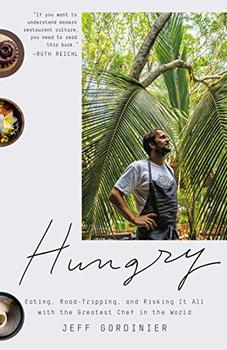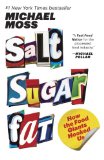Summary | Excerpt | Reviews | Beyond the book | Read-Alikes | Genres & Themes | Author Bio

Renegade Chefs, Fearless Eaters, and the Making of a New American Food Culture
by Dana GoodyearIt was in Montreal a couple of years ago that my family and I inadvertently wandered into a restaurant "experience," a kind that we had never encountered before (or since). Quite hungry and already way past our dinner time, we came upon Dans Le Noir, a place where one eats in pitch darkness. The complete and utter lack of light was meant to enhance our focus on taste and while it certainly did, the surreal nature of the evening left us a tad shaken and wondering what exactly it was that we had walked into and how prevalent such out-of-the-norm dining experiences truly were. Judging by the many wild and interesting "food-as-sport" activities covered in Dana Goodyear's Anything That Moves, Dans Le Noir turns out to serve pretty run-of-the-mill, if not tame, fare.
When it comes to food, we're at a point in time when many disparate events have created a special kind of confluence. The rise of social media, the growing popularity of the Food Network, and increasingly porous international borders have lead to bolder and more adventurous palates. "So-called food porn is the most popular content on Pinterest, one of the fastest-growing websites in history, and it dominates the photo-sharing sites Instagram and Flickr. It's everywhere on TV. And, as with any fetish, the more outlandish and rarefied a find, the more a foodie likes it," Goodyear writes.
And "outlandish" is represented well: quite literally, anything that moves is fair game for the daring. Escamoles sounds innocent enough until you translate it: are you bold enough to eat ant eggs? Many are. Goodyear outlines the cultural sensitivities that are a big factor of what one considers food. Whale meat, for example, is sought after in Japan, yet is widely reviled in much of the western world. Goodyear reminds her readers that those of us who turn our noses up at insects might soon have to bend a little, given that it's a readily available source of protein at a time when the globe is increasingly straining to meet food demand. The arguments here are so coherent and well laid-out that it's hard to challenge a whale-meat eater who says his line is drawn at factory-farmed meat.
In another chapter we visit with Los Angeles-based Jonathan Gold, a food critic who has won a Pulitzer for his work. As you travel down LA's streets with Gold and Goodyear, I challenge you not to drool at the marvelous food they try and Goodyear so lovingly describes. For the timid, I should add that I am a vegetarian, yet there was never one point or food description that made me squeamish.
Another chapter is devoted to the raw food movement (see Beyond the Book), members who gather around in secret hideouts to defy government rules and eat raw. "In foodies' disdain for the rules, there is a note of snobbery: What could the feds possibly tell them about food?" Goodyear writes. In yet another report we learn about vaporizers that are used to create vivid taste sensations with herbs and other foods. James Beard award-winning chef Grant Achatz's signature vapor is lavender, "which he serves in a plastic balloon covered in Irish linen, under a bowl of yuzu pudding, ham nage, and gooseberry coulis. Before presenting the dish, the waiter punctures the bag of lavender air with a syringe in a four-by-four grid, so that the weight of the bowl releases the scent."
Goodyear, who is a staff writer for The New Yorker, weaves bits of history into the story of the American palate that has expanded this far. She reminds us about the need to legislate food safety and chronicles the growth of the American gourmet industry from its humble beginnings.
Anything That Moves is a winning and delicious account of avant-garde American cuisine. Many of its chapters have been cobbled together from content formerly published in The New Yorker and occasionally the book lacks a tight coherence. It's subtitle - Renegade Chefs, Fearless Eaters, and the Making of a New American Food Culture - tries to remedy this lapse somewhat but doesn't completely succeed. Nevertheless Anything That Moves is reporting at its best and deserves a wide and enthusiastic audience. At a time when even Subway has embraced the spicy Sriracha sauce, the book is also incredibly timely; practically everyone, it seems, is a self-proclaimed adventurous foodie.
At one point, Goodyear talks about one of the original foodies, Maurice Dreicer, who, in the 1940s, went around the best restaurants with elaborate equipment to test their steaks. His devotion to the search for the perfect slab was unquestionable. "Women talk too much," he is believed to have said. "A steak eater should not be distracted, so he can receive the utmost enjoyment from the steak." While today's foodies might not be quite as blunt, Anything That Moves shines light on the sentiment behind that statement. It is to Goodyear's credit that we can see what Dreicer is really getting at. After all, as food critic Jonathan Gold says, it's not just about food, it's also about eating.
![]() This review was originally published in The BookBrowse Review in January 2014, and has been updated for the
November 2014 edition.
Click here to go to this issue.
This review was originally published in The BookBrowse Review in January 2014, and has been updated for the
November 2014 edition.
Click here to go to this issue.

If you liked Anything That Moves, try these:

by Jeff Gordinier
Published 2020
A food critic chronicles four years spent traveling with renowned chef René Redzepi in search of the most tantalizing flavors the world has to offer.

by Michael Moss
Published 2014
The explosive story of the rise of the processed food industry and its link to the emerging obesity epidemic.
Your guide toexceptional books
BookBrowse seeks out and recommends the best in contemporary fiction and nonfiction—books that not only engage and entertain but also deepen our understanding of ourselves and the world around us.